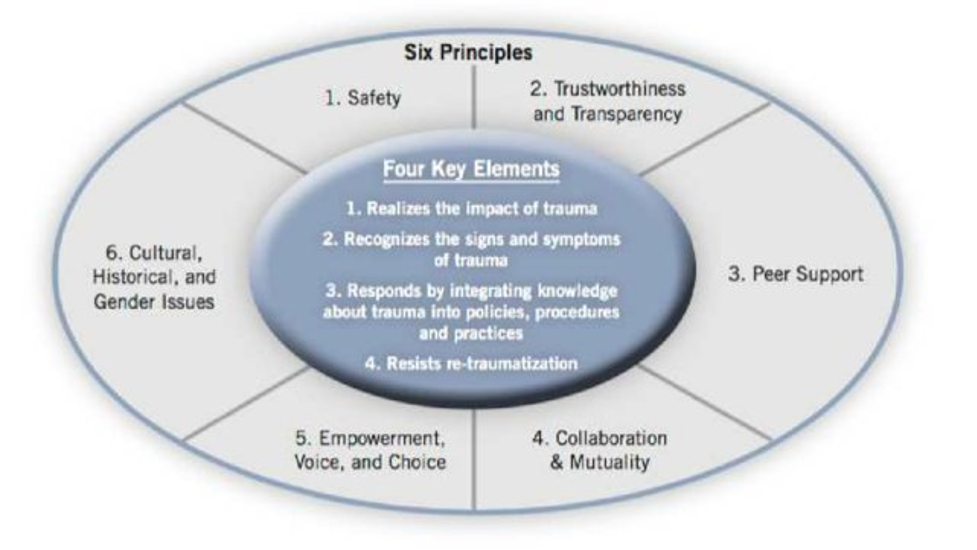
I am Martha Brown, Ph.D. president of RJAE Consulting, and curator of Trauma-Informed (TI) Evaluation Week. Being trauma-informed means you 1) realize the impact of trauma, 2) recognize the signs and symptoms of trauma, 3) respond by integrating knowledge about trauma into policies, procedures, and practices, and 4) resist re-traumatization. While information about trauma and principles of TI practices comes primarily from the fields of public and mental health and education, we can apply those principles to our work while our field develops its own literature on TI evaluation practices.
First, a few definitions. Trauma isthe result of “an event, series of events, or set of circumstances that is experienced by an individual as emotionally harmful or life threatening and that has lasting effects on the individual’s functioning and mental, physical, social, or spiritual well-being.” Adverse Childhood Experiences (ACEs) is the term used to describe all types of abuse, neglect, and other potentially traumatic experiences that occur to people under the age of 18.
The principles of trauma-informed practice provide a strengths-based framework grounded in an understanding of and responsiveness to the impact of trauma. They emphasize physical, psychological, and emotional safety for both providers (including evaluators) and survivors and create opportunities for survivors to rebuild a sense of control. The principles are safety; trustworthiness and transparency; peer support; collaboration and mutuality; empowerment, voice, and choice; and cultural, historic and gender issues.

As evaluators and humans, many of us have likely experienced trauma ourselves. Plus, we often work with people and communities who have experienced individual and/or collective trauma. Trauma lives in us and around us, so it is vital that we are trauma-informed, even if the programs we evaluate are not (yet).
This week, six evaluators will share about TI data collection, the relationship between our own trauma and our work, and systems change. To be a TI evaluator, we must first and/or simultaneously recognize and heal from our own traumas. The work happens from the inside out, but we cannot do this work alone. Healing and transformation happen in community, and we are building a community of TI evaluators. As we embark on our own healing journeys, our practices will subsequently change and align more with the principles of TI practice. Then, as healed and aware evaluators, we can assist programs, organizations, and systems to become trauma-informed.
Hot Tips:
Use the links, resources, and tips provided this week to learn more. Embrace the transformation toward healing and becoming trauma-informed.
Reflect on how these principles show up (or not) in your life, practice, and programs. Keep a journal and ask yourself: How does your own trauma, and the trauma of others, play out in your work? How has evaluation traumatized individuals and groups? What do you need to be a more trauma-informed evaluator?
Rad Resources:
This self-paced online course – Becoming Trauma-Informed: Applying the Principles of Trauma-Informed Care to Your Life, Work and Community
Healing Breathwork with Libby Smith
This week, AEA365 is hosting Trauma-informed Eval Week during which blog authors share lessons from and principles of trauma-informed evaluation. Do you have questions, concerns, kudos, or content to extend this aea365 contribution? Please add them in the comments section for this post on the aea365 webpage so that we may enrich our community of practice. Would you like to submit an aea365 Tip? Please send a note of interest to aea365@eval.org. aea365 is sponsored by the American Evaluation Association and provides a Tip-a-Day by and for evaluators.

Thank you, i just heard the presentation through the Healthcare excellence Canada group and especially appreciated the added insights around self-compassion to address one’s distress response. This in many ways speaks to the responsibility of our organizations to provide the caregiver support to be able to create the meaningful caregiver satisfaction. Helps to push for systems change that is trauma-informed… thank you!
Trauma can have long-lasting effects on a person’s mental and physical health. It’s important to recognize the impact trauma can have on an individual and to provide support and resources to help them heal.